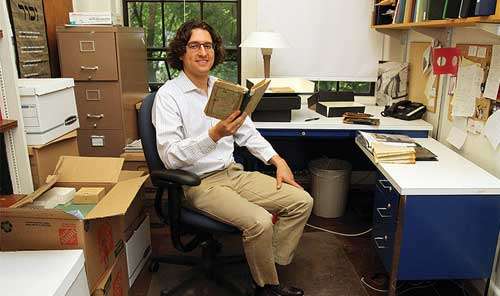Devin Naar, assistant professor of history and Jewish studies at the University of Washington in Seattle, surrounded by boxes of source materials for his Sephardic Treasures Project. He is holding Istoria Djudia Universal (Universal Jewish History), published in Ladino in Istanbul, 1925.
Photo by Joshua Bessex/The Daily of the University of Washington.
While doing research for his doctoral dissertation, Dr. Devin Naar discovered that more than 11,000 Yiddish books are available in digital form. The search for digitized books in Ladino, however, revealed little but virtual empty shelves.
Ladino is the Judeo-Spanish language of the Sephardim, Jews whose ancestors were expelled from Spain in the 15th century then settled along the Mediterranean basin and in countries of the Ottoman Empire.
Now an assistant professor of history and Jewish studies at the University of Washington in Seattle, Naar has embarked on the Sephardic Treasures Project to collect, preserve, and digitize the Ladino and Sephardi literary and cultural heritage in America. He is in the process of producing the first-ever on-line digital Ladino library.
Naar’s interest in the history of the Sephardim is personal and stems from his childhood in New Jersey. His ancestors came from Salonika, Greece, which, he said, was once the largest Ladino-speaking community in the world.
One hundred years ago, its 90,000 Jews made up more than half the city’s residents. Close to 90 percent of the Jews of Greece were murdered by the Nazis. In Salonika today, 1,000 Jews remain in a city of one million inhabitants.
After immigrating to America, Naar’s great-grandfather Benjamin Haim Naar (1880-1954) was the first ordained rabbi of the oldest Sephardi synagogue in New Jersey, Congregation Etz Ahaim in Highland Park.
In his youth, Naar was often perplexed by his singular family history. “My great-grandfather was born in the Ottoman empire,” he told NJJN. “There are pictures of him wearing a Turkish fez. His son, my grandfather, was born in the same city of Salonika, but at that time it was part of Greece. Instead of speaking Turkish or Greek like his father, he spoke medieval Spanish, written in Hebrew letters.”
Naar, who spoke with NJJN from his office in Seattle, taught himself to read Ladino and embarked on a project to demystify his own heritage by collecting and archiving family documents and books dating as far back as 1815.
Among the materials were a number of letters to his great-grandfather describing the fate of relatives who stayed in Greece and perished in the Holocaust. One series of missives is between a young girl on the island of Rhodes, which was under Nazi occupation, and her relatives in Seattle.
“Her correspondences eventually led her and her family out of Nazi-occupied Greece to safety in Seattle,” Naar said. “Most people who submit these documents to me cannot read them. It’s a very mutually enriching experience to give back some insight into their families and community.”
Together with Dr. Nathan Reiss, a longtime member of Etz Ahaim and an officer of the Jewish Historical Society of Central Jersey, Naar digitized some of the early minutes of the Etz Ahaim board meetings from the 1930s, which were written in Ladino.
Now a resident of Seattle, which boasts one of the nation’s largest Sephardi communities, Naar has launched a broader community-based initiative to collect and digitize Ladino source materials.
“My hope is that this grassroots project in Seattle may serve as a model for other Sephardi communities throughout the country, including and especially New Jersey,” he said. “As my roots are there, I have a particular interest and investment in making sure that the Sephardi treasures of New Jersey may also be made more accessible and preserved for future generations.”
Naar’s on-line library focuses primarily on the history of Greek Jews, but he hopes one day to undertake a similar project for the Syrian Jewish communities of America, including Deal’s.
For more information about the on-line Ladino library, contact Naar at 206-616-6202 or [email protected].



bien me plazio este tema!
Felicidades!